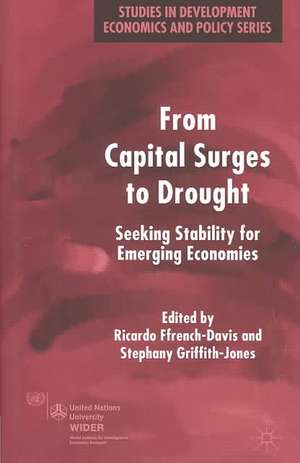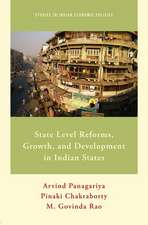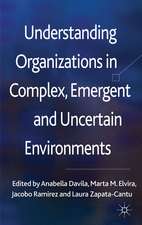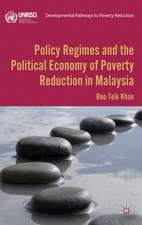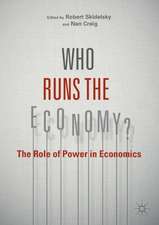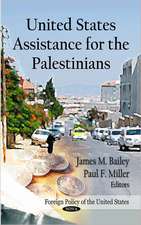From Capital Surges to Drought: Seeking Stability for Emerging Economies: Studies in Development Economics and Policy
Editat de R. Ffrench-Davis, S. Griffith-Jonesen Limba Engleză Hardback – 23 oct 2003
| Toate formatele și edițiile | Preț | Express |
|---|---|---|
| Paperback (1) | 640.37 lei 43-57 zile | |
| Palgrave Macmillan UK – 2003 | 640.37 lei 43-57 zile | |
| Hardback (1) | 645.28 lei 43-57 zile | |
| Palgrave Macmillan UK – 23 oct 2003 | 645.28 lei 43-57 zile |
Din seria Studies in Development Economics and Policy
- 18%
 Preț: 688.91 lei
Preț: 688.91 lei -
 Preț: 385.62 lei
Preț: 385.62 lei - 15%
 Preț: 641.38 lei
Preț: 641.38 lei - 15%
 Preț: 641.20 lei
Preț: 641.20 lei - 15%
 Preț: 641.20 lei
Preț: 641.20 lei - 15%
 Preț: 645.60 lei
Preț: 645.60 lei - 15%
 Preț: 637.78 lei
Preț: 637.78 lei - 15%
 Preț: 651.99 lei
Preț: 651.99 lei - 15%
 Preț: 646.75 lei
Preț: 646.75 lei - 15%
 Preț: 643.34 lei
Preț: 643.34 lei - 15%
 Preț: 644.63 lei
Preț: 644.63 lei - 15%
 Preț: 638.57 lei
Preț: 638.57 lei - 15%
 Preț: 644.95 lei
Preț: 644.95 lei - 15%
 Preț: 644.95 lei
Preț: 644.95 lei - 15%
 Preț: 653.14 lei
Preț: 653.14 lei -
 Preț: 391.61 lei
Preț: 391.61 lei - 15%
 Preț: 644.18 lei
Preț: 644.18 lei - 15%
 Preț: 643.16 lei
Preț: 643.16 lei - 15%
 Preț: 641.71 lei
Preț: 641.71 lei - 15%
 Preț: 646.75 lei
Preț: 646.75 lei - 18%
 Preț: 972.93 lei
Preț: 972.93 lei - 15%
 Preț: 644.49 lei
Preț: 644.49 lei - 15%
 Preț: 641.71 lei
Preț: 641.71 lei - 15%
 Preț: 639.90 lei
Preț: 639.90 lei - 15%
 Preț: 643.34 lei
Preț: 643.34 lei - 18%
 Preț: 938.81 lei
Preț: 938.81 lei - 15%
 Preț: 641.53 lei
Preț: 641.53 lei - 18%
 Preț: 727.97 lei
Preț: 727.97 lei - 15%
 Preț: 642.03 lei
Preț: 642.03 lei
Preț: 645.28 lei
Preț vechi: 759.15 lei
-15% Nou
Puncte Express: 968
Preț estimativ în valută:
123.48€ • 129.24$ • 102.77£
123.48€ • 129.24$ • 102.77£
Carte tipărită la comandă
Livrare economică 31 martie-14 aprilie
Preluare comenzi: 021 569.72.76
Specificații
ISBN-13: 9781403916310
ISBN-10: 1403916314
Pagini: 352
Ilustrații: XVI, 340 p.
Dimensiuni: 140 x 216 x 24 mm
Greutate: 0.55 kg
Ediția:2003
Editura: Palgrave Macmillan UK
Colecția Palgrave Macmillan
Seria Studies in Development Economics and Policy
Locul publicării:London, United Kingdom
ISBN-10: 1403916314
Pagini: 352
Ilustrații: XVI, 340 p.
Dimensiuni: 140 x 216 x 24 mm
Greutate: 0.55 kg
Ediția:2003
Editura: Palgrave Macmillan UK
Colecția Palgrave Macmillan
Seria Studies in Development Economics and Policy
Locul publicării:London, United Kingdom
Cuprins
Capital Flows to Emerging Economies: Does the Emperor have clothes?; S.Griffith-Jones Financial Crises and National Policy Issues: An Overview; R.Ffrench-Davis PART I: THE SUPPLY OF CAPITAL Liquidity Black Holes; A.Persaud International Bank Lending: Water Flowing Uphill; J.Hawkins Bank Lending to Emerging Markets; D.Lubin Derivatives, the Shape of International Capital Flows and the Virtues of Prudential Regulation; R.Dodd Ratings Since the Asian Crisis; H.Reisen Proposals for Curbing the Boom-Bust Cycle in the Supply of Capital to Emerging Markets; J.Williamson Non-financial Corporate Risk Management and Exchange Rate Volatility in Latin America; G.Moguillansky The New Basel Accord and Developing Countries; S.Griffith-Jones & S.Spratt The Instability of the Emerging Market Assets Demand Schedule; V.FitzGerald PART II: NATIONAL POLICY RESPONSES Capital-Account and Counter-Cyclical Prudential Regulation in Developing Countries; J.A.Ocampo How Optimal are the Extremes? Latin American Exchange Rate Policies during the Asian Crisis; R.Ffrench-Davis & G.Larraín Counter-Cyclical Fiscal Policy; C .Budnevich Financial Regulation and Supervision in Emerging Markets: The Experience of Latin America since the Tequila Crisis; B.Stallings & R.Studart
Recenzii
'The project comprises of numerous other papers that researchers have contributed to this huge and far-impacting report, soon to be published as a book. It will provide an in-depth analysis of new trends in the supply of vehicles of capital flows and their determinants, as well as an evaluation of national policies to reduce volatility, which is basically a reflection of shortcomings in the countries' development process and the weakness of their mechanisms for regulating transactions that have opened the way for unusual financial crises in those systems.' - Roma Rana, United Nations Chronicle
'If one ranks subjects by the ratio of their importance to human welfare over the extent of understanding of them among the educated public, the subject of capital mobility and capital controls must come near the top of the list. This book is a marvellously lucid and accessible set of essays from some of the leading experts in the field - who unlike many other contributors to the literature, do not assume that what is best for finance is best for the whole economy and society.' - Robert Hunter Wade, Professor of Political Economy, Development Studies Institute, London School of Economics
'This book is outstanding in combining economic analysis with policy implications at the national and international level. It looks at capital flows to emerging markets from different perspectives and provides a comprehensive overview of problems, issues and possible solutions without getting lost in economic jargon. This seminal work must be read by anyone concerned about international development and the future of the world economy.' - Bernhard G. Gunter, EPIAM Project Director, New Rules for Global Finance Coalition, Washington DC
'This edition contains different contributions by well-known scholars on capital flows to emerging market economies. The book is a must read both for practitioners as well as academics interested in up to date analyses of the determinants and policy implications of capital flows to emerging markets since the Asian crisis.' - Robert Lensink, Professor in Finance and Financial Markets, Department of Finance, Faculty of Economics, University of Groningen
'The period following the Asian crisis has not only witnessed a big decline in the size of capital flows to emerging markets, but also a great deal of volatility in those flows. Ffrench Davis, Griffith-Jones and collaborators have produced an extremely useful synthesis of developments that have contributed to the decline and volatility in capital flows, with thoughtful analysis and generous statistics to support it. The attempts to redesign the international financial architecture need to pay careful attention to reforms by suggesting changes that both borrowers and lenders need to make. This book is a timely attempt to seek to address this vital issue by suggesting reforms that could be made to make recipient countries less vulnerable to global financialinstability.' - Abdur Chowdhury, Chief Economist and Director, Economic Analysis Division, United Nations Economic Commission for Europe, Geneva
'If one ranks subjects by the ratio of their importance to human welfare over the extent of understanding of them among the educated public, the subject of capital mobility and capital controls must come near the top of the list. This book is a marvellously lucid and accessible set of essays from some of the leading experts in the field - who unlike many other contributors to the literature, do not assume that what is best for finance is best for the whole economy and society.' - Robert Hunter Wade, Professor of Political Economy, Development Studies Institute, London School of Economics
'This book is outstanding in combining economic analysis with policy implications at the national and international level. It looks at capital flows to emerging markets from different perspectives and provides a comprehensive overview of problems, issues and possible solutions without getting lost in economic jargon. This seminal work must be read by anyone concerned about international development and the future of the world economy.' - Bernhard G. Gunter, EPIAM Project Director, New Rules for Global Finance Coalition, Washington DC
'This edition contains different contributions by well-known scholars on capital flows to emerging market economies. The book is a must read both for practitioners as well as academics interested in up to date analyses of the determinants and policy implications of capital flows to emerging markets since the Asian crisis.' - Robert Lensink, Professor in Finance and Financial Markets, Department of Finance, Faculty of Economics, University of Groningen
'The period following the Asian crisis has not only witnessed a big decline in the size of capital flows to emerging markets, but also a great deal of volatility in those flows. Ffrench Davis, Griffith-Jones and collaborators have produced an extremely useful synthesis of developments that have contributed to the decline and volatility in capital flows, with thoughtful analysis and generous statistics to support it. The attempts to redesign the international financial architecture need to pay careful attention to reforms by suggesting changes that both borrowers and lenders need to make. This book is a timely attempt to seek to address this vital issue by suggesting reforms that could be made to make recipient countries less vulnerable to global financialinstability.' - Abdur Chowdhury, Chief Economist and Director, Economic Analysis Division, United Nations Economic Commission for Europe, Geneva
Notă biografică
CARLOS L. BUDNEVICH Banco Central de Chile, Santiago, ChileRANDALL DODD Director, Derivatives Study Center, Washington DC, USAVALPY FITZGERALD University Reader in International Economics and Finance, University of Oxford, UKJOHN HAWKINS Senior Economist, Monetary and Economic Department, Bank for International Settlements, Basel, SwitzerlandGUILLERMO LARRAÍN RÍOS Chief Economist of BBVA Banco Bhif, and Associate Fellow, Centro de Economia Aplicada, Universidad de Chile, Sanitgao, ChileDAVID LUBIN Emerging Market Economist, HSBC, London, UKGRACIELA MOGUILLANSKY, Economist, Unit on Investment and corporate Strategies, United Nations Economic Commission for Latin America and the Caribbean ECLAC/CEPAL, Santiago, ChileJOSÉ ANTONIO OCAMPO Executive Secretary, United Nation Economic Commission for Latin AmericaAVINASH PERSAUD Managing director, State Street Bank and Trust Company and Visiting Fellow, Cambridge Endowment for Research in Finance, Judge Institute, UKHELMUT REISEN Head of Research Division, OECD Development, Paris, FranceSTEPHEN SPRATT DPhil student, University of Sussex, UKBÁRBARA STALLINGS Director of the Economic Development Division of the United Nations Economic Commission for Latin America and the Caribbean, Santiago, ChileROGERIO STUDART Economic Affairs Officer of the United Nations Economic Commission for Latin America and the Caribbean, Santiago, ChileJOHN WILLIAMSON Senior Fellow, Institute for International Economics,Washington DC, USA
